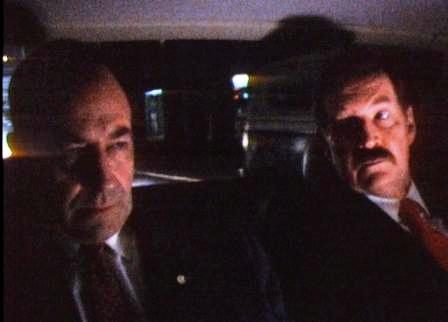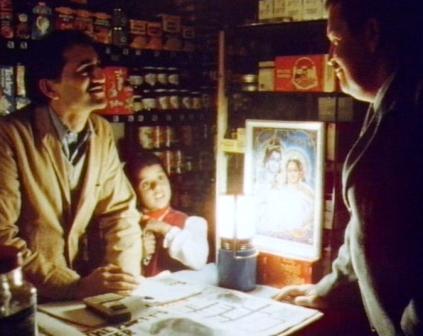
A Very British Coup
by Harry Dobermann
Not exactly "ripped from today's headlines", but having a resonance with what's happening in today's Labour party, "A Very British Coup"is a 1988 adaptation of former MP Chris Mullin's novel about an idealistic left wing leader and the efforts by the establishment to undermine him.

Above - Inspector Page (Bernard Kay) and Harry Perkins (Ray McAnally)
Scripted by Alan Plater and directed by Mick Jackson (who had blown up Sheffield in the nuclear war drama THREADS ) the series won BAFTA and EMMY awards but then sank into obscurity (an almost unrecognisable remake called "Secret State" starring Gabriel Byrne was broadcast by Channel 4 in 2012).
The controversial rise of Jeremy Corbyn to Labour party leadership may have inspired the re-release of Acorn's 2011 DVD, although the story is very much of its time.
The series stars Ray McAnally as Harry Perkins, a former Steelworker and Sheffield MP who leads the Labour Party to victory in the early 1990's.Perkins is an old-school socialist who calls everyone comrade. When a reporter asks him in the victory train up to London if it's true that he intends to do away with First Class Carriages, he says no, he intends to do away with Second Class Carriages. "I think all people are First Class."
Perkins announces a number of ideological policies such as nuclear disarmament and removing all American military bases from UK soil. He also promises to bring in open government (When someone warns that Perkins is going to tell the truth on TV, another character says, "He can't do that!He's the Prime Minister!" ).
The most predictable aspect of the story is that Perkins is undermined by the press, the establishment and the ambitions of his colleagues almost as soon as he enters Number Ten. It's satisfying, if not always convincing, to see Perkins out-manouevre his opponents, but a sense of doom overlays the production. The series looks low budget and reminds us how grim Britain was in the 1980's, although cinematographer Ernie Vincze makes the gloom atmospheric, particularly during some "Winter of Discontent" power cuts.
Despite being played with a charismatic twinkle by Ray McAnally, Perkins is a "beer-and-sandwiches" socialist of the type thought to have been sidelined by New Labour. He is different from Corbyn, who seems to have been empowered by a left-wing variant of the public irritation with identikit professional politicans that led to the rise of UKIP.It's arguable that both UKIP and Corbyn represent "none of the above" on the ballot paper, whereas Perkins is shown to be swept to power on a wave of acclaim.

Nevertheless, two of the most affecting moments in "A Very British Coup" are personal. In one scene Perkins visits his newsagent Patel (Harmage Singh Kalirai) during the depths of a crisis when the press is saying he's finished. Patel says he is proud to tell people about "My neighbour, Mr Perkins, the Prime Minister". When Perkins asks what he thinks about the views expressed in the newspapers, Patel says, "I sell cigarettes but I don't smoke....you are not red scum"
The other scene comes when his protection officer, Inspector Page (Bernard Kay) has stopped a conspirator from interfering with a crucial TV broadcast. Perkins thanks him, and Page says, "With respect sir, I don't actually vote for you - but I know what's right."
It goes without saying that the biggest advantage Perkins has over Jeremy Corbyn is dialogue by Alan Plater.
Ironically, Ray McAnally's first big TV role had been in Robin Chapman's 1968 TV series about the reptilian gangster "Spindoe". Like its controversial successor "Big Breadwinner Hog", "Spindoe" portrayed London's gangsters with overtones of Jacobean theatre. And Jacobean villainy also inhabited "House of Cards", Andrew Davies' 1990 adaptation of Michael Dobbs' novel.

It's tempting to say that "House of Cards" had the advantage of timing. Both "A Very British Coup" and "House of Cards" were set in a post-Thatcher future. But where "Coup" was broadcast while Thatcher was still very much in power and a future without her seemed unthinkable, "House of Cards" was broadcast in the period that she fell. In the DVD commentary, Ian Richardson recalls hearing the announcement of her resignation while driving to a TV interview about the show and arriving at the TV studio, trembling with the potency of the moment.
Where Perkins spent much of his time reacting to events, Prime Minister Francis Urquhart was, of-course, the main mischief-maker, bullying, manipulating and eradicating those who stood in his way, And all the time, taking the audience into his confidence with his catchphrase,"You might think that...I couldn't possibly comment."
It's probably fair to say that Urquhart was the more attractive figure in the popular imagination, encouraging the audience to empathise with the baying House of Commons scenes as he confides to the camera "Now it's time to give them some stick."

It's easy to forget is that Urquhart himelf was partly manipulated by his Lady MacBeth-like wife (played by Diane Fletcher). In true Shakespearian style, Urquhart begins as a loyal whip to the new Prime Minister and only begins his climn to power when his plans for a hard right Government (with himself in the Cabinet) are rejected.
Both Perkins and Urquhart now seem incredible characters - Perkins because the old-style Labour politician seems so anachronistic, now that New Labour professionals push the idea that they can only form a "credible opposition" if they appear to be Tory Lite - and Urquhart because while the public image of politicians has never been lower, we still like to think they would stop short of murder.